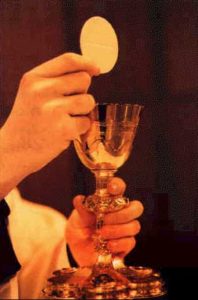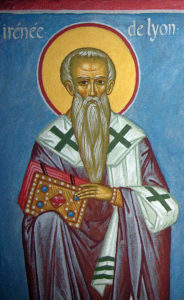 They are totally foolish, these people who despise the whole saving plan of God, who deny the salvation of the flesh, and scorn its regeneration, claiming it is not capable of incorruptibility. If the flesh is not saved, the Lord did not redeem us by His Blood, the cup of the Eucharist is not communion in His Blood, and the bread we break is not communion in His Body. For blood can only come from veins, flesh, and whatever else makes up the substance of man. All this the Word of God really and truly became, in order to redeem us by His Blood. As the apostle says, “In Him we have redemption through His Blood, the remission of sins” (Col. 1:14).
They are totally foolish, these people who despise the whole saving plan of God, who deny the salvation of the flesh, and scorn its regeneration, claiming it is not capable of incorruptibility. If the flesh is not saved, the Lord did not redeem us by His Blood, the cup of the Eucharist is not communion in His Blood, and the bread we break is not communion in His Body. For blood can only come from veins, flesh, and whatever else makes up the substance of man. All this the Word of God really and truly became, in order to redeem us by His Blood. As the apostle says, “In Him we have redemption through His Blood, the remission of sins” (Col. 1:14).
And because we are His members, we are nourished by means of creation, the creation which He Himself gives us by making His sun to rise and sending the rain as He pleases (cf Matt. 5:45). The cup, which is part of creation, He declares to be His Blood, by which our own blood is fortified, and the bread, which is part of creation, He affirms to be His Body, by which our own body is fortified.
So then, if the mixed cup and the manufactured bread receive the Word of God and become the Eucharist, that is to say, the Blood and Body of Christ, which fortify and build up the substance of our flesh, how can these people claim that the flesh is incapable of receiving God’s gift of eternal life, when it is nourished by Christ’s Blood and Body and His member? As the blessed apostle says in his letter to the Ephesians, “For we are members of His Body, of His flesh and of His bones” (Eph. 5:30). He is not talking about some kind of “spiritual” and “invisible” man, “for a spirit does not have flesh and bones” (Luke 24:39). No, he is talking of the organism possessed by a real human being, composed of flesh and nerves and bones. It is this which is nourished by the cup which is His Blood, and is fortified by the bread which is His Body. The stem of the vine takes root in the earth and eventually bears fru it, and “the grain of wheat falls into the earth” (John 12:24), dissolves, rises again, multiplied by the all-containing Spirit of God, and finally, after skilled processing, is put to human use. These two then receive the Word of God and become the Eucharist, which is the Body and Blood of Christ. Similarly, our bodies, having been nourished by the Eucharist, having been laid to rest in the earth, and having there dissolved, will rise again at their appointed time, for the Word of God will grant them resurrection “to the glory of God the Father” (cf Phil. 2:11). He will clothe the mortal with immortality and freely bestow incorruptibility on the corruptible (cf 1 Cor. 15:53), for God’s power is made perfect in weakness (cf 2 Cor. 12:9). So we must never become puffed up, as if we had the source of life within ourselves, asserting ourselves, with ungrateful minds, against God. In fact, experience should teach us that it is through God’s grandeur and not our own nature that we possess eternal duration.
the vine takes root in the earth and eventually bears fru it, and “the grain of wheat falls into the earth” (John 12:24), dissolves, rises again, multiplied by the all-containing Spirit of God, and finally, after skilled processing, is put to human use. These two then receive the Word of God and become the Eucharist, which is the Body and Blood of Christ. Similarly, our bodies, having been nourished by the Eucharist, having been laid to rest in the earth, and having there dissolved, will rise again at their appointed time, for the Word of God will grant them resurrection “to the glory of God the Father” (cf Phil. 2:11). He will clothe the mortal with immortality and freely bestow incorruptibility on the corruptible (cf 1 Cor. 15:53), for God’s power is made perfect in weakness (cf 2 Cor. 12:9). So we must never become puffed up, as if we had the source of life within ourselves, asserting ourselves, with ungrateful minds, against God. In fact, experience should teach us that it is through God’s grandeur and not our own nature that we possess eternal duration.
Irenaeus, Bishop of Lyons (130-200)
Against the Heresies
